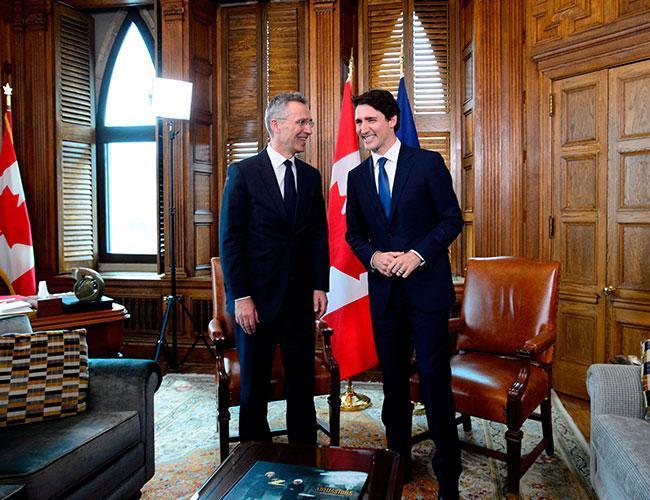
NATO does not want a new arms race with Russia, the alliance’s secretary general has said amid heightened tensions following an ex-spy’s poisoning in England.
“We don’t want a new arms race, so we are focused on how can we respond” in a “firm strong predictable, but also measured and defensive, way,” Jens Stoltenberg told reporters alongside Canadian Prime Minister Justin Trudeau in Ottawa on April 4.
“We don’t want a new Cold War,” he said.
He made the remarks when asked about the possibility of new NATO sanctions against Russia after former spy Sergei Skripal and his daughter were poisoned in England on March 4.
London and its allies have blamed Moscow for the attack, citing the use of a Soviet-designed nerve agent Novichok, Russia’s record of targeting dissidents and its history of aggression in recent years, from Crimea to cyber-attacks.
“We will continue to strive for a more constructive relationship with Russia,” Stoltenberg said.
Russia’s call for a joint inquiry to be held into the poisoning failed on April 4 when it was outvoted 15-6 at a meeting of the global chemical weapons watchdog.
Russia had called an emergency meeting of the decision-making executive of the Organization for the Prohibition of Chemical Weapons to counter accusations by Britain that it was behind the March 4 nerve agent poisoning.
U.K.’s security services believe they have pinpointed the location of Russian laboratory that manufactured the nerve agent Novichok used in Salisbury attack, The Times reported on April 5. Britain was aware of the existence of the site before March 4, the report said.
British Foreign Minister Boris Johnson welcomed Russia’s defeat.
“Russia has had one goal in mind since the attempted murders on U.K. soil through the use of a military-grade chemical weapon - to obscure the truth and confuse the public,” he said in a statement.
“The international community has yet again seen through these tactics and robustly defeated Russia’s attempts today to derail the proper international process.”
The closed-door OPCW meeting itself triggered sharp verbal exchanges between the Britain and Russia’s representatives.
In a tweet, the British delegation called Moscow’s idea for a joint investigation “a diversionary tactic, and yet more disinformation designed to evade the questions the Russians authorities must answer.”
Russian Foreign Minister Sergei Lavrov said Thursday London cannot ignore Moscow’s “legitimate questions,” as he called for a “substantial and responsible” probe into the case.
Three buses believed to be carrying expelled American diplomats departed from the U.S. Embassy in Moscow on April 5.
Before the morning departure, journalists outside the embassy compound saw people leaving the residences, placing luggage on trucks. Some toted pet-carriers.
Russia last week ordered 60 American diplomats to leave the country by April 5 in retaliation for the United States expelling the same number of Russians.
More than 150 diplomats have been expelled by Britain and allies, and Russia has ordered reciprocal moves.